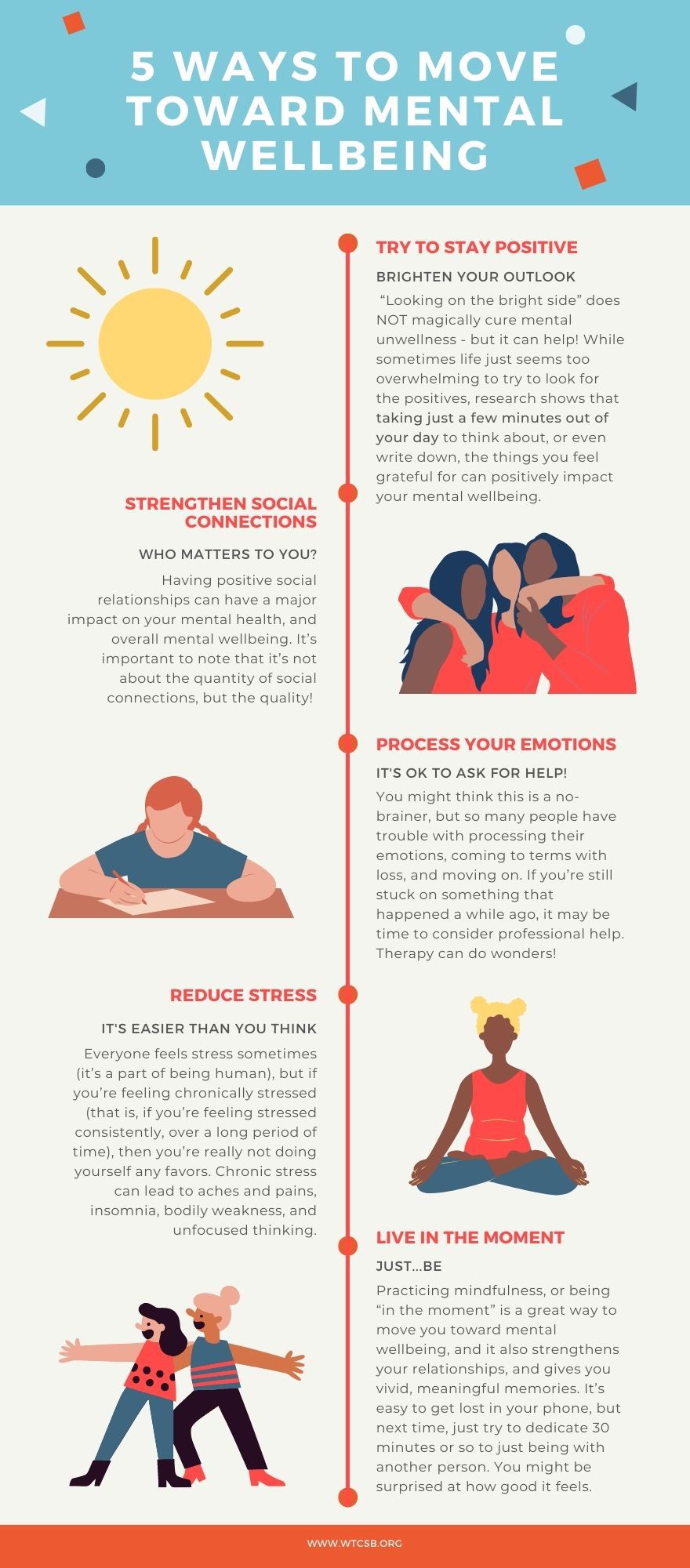Mental health is a topic we all have a stake in.
If you’re not dealing with depression, anxiety or another mental illness, you most likely know someone who is.
1 in 5 people will experience mental illness in a given year, and we all experience challenges in life that take a toll on our mental health.
You’ve probably heard a lot about mental health and mental wellness, but have you heard about mental wellbeing? And how is it different from mental health?
What is Mental Wellbeing? How Is It Different From Mental Health?
Mental Health deals with behaviors or disruptions that affect the brain or mind. This could be a result of a naturally occurring imbalance of the chemicals in the brain, or it could be due to unprocessed trauma, grief or other issues happening in the person’s life.
Mental health problems include:
- Depression
- Anxiety
- PTSD
- Eating Disorders
- Bipolar Disorder
- Etc.
When you take care of your physical and mental health and use options like individual or group therapy or medications to manage your mental illness, you are working to ensure that you experience mental health.
Mental wellbeing or mental wellness, on the other hand, is a lifelong, renewable, and positive resource that we have that helps us to live a life characterized by good mental health.
According to the Global Wellness Institute, mental wellness is made of up the following four components:
- Mental – How we think and how we process, understand and use information
- Emotional – How we manage and express our emotions
- Social – How we connect with others; our relationships
- Psychological – How we act or function; how we make decisions and do things
Basically, mental wellness means “feeling good, being resilient and functional, enjoying positive relationships, contributing to society or community, realizing potential, and having a sense of fulfillment or coherence.” Mental health is one part of mental wellbeing.
Mental Wellbeing is Made Up of Four Components:
Because mental wellbeing or mental wellness has several components, it might seem overwhelming to even begin to think about the state or your overall mental wellbeing. But it’s easy to determine, simply by looking at the four areas of mental wellbeing:
- Mental –Do you feel that you are able to sufficiently process, understand and use information? Do you feel that your mental capabilities hold you back in any way?
- Emotional –Do you feel that you can express your emotions? Can you manage them – i.e. can you keep yourself from yelling at or breaking down in tears in front of a partner or co-worker, or are these kinds of emotional outbursts common?
- Social –Do you feel that you have meaningful and healthy relationships with others?
- Psychological –Do you notice any issues with how you function overall; are there any major behavioral issues that are affecting your life?
What Can I Do To Move Toward Mental Wellbeing?
Try to Stay Positive
We know, we know! “Looking on the bright side” does NOT magically cure mental unwellness – but it can help!
While sometimes life just seems too overwhelming to try to look for the positives, research shows that taking just a few minutes out of your day to think about, or even write down, the things you feel grateful for can positively impact your mental wellbeing, and can help you to “feel more positive emotions, relish good experiences, improve their health, deal with adversity, and build strong relationships.”
Strengthen Those Social Connections
Having positive social relationships can have a major impact on your mental health, and overall mental wellbeing. It’s important to note that it’s not about the quantity of social connections, but the quality!
And if you don’t have a healthy relationship with family or with other people in your life, don’t force yourself to suffer through it! This is your life we’re talking about here. Do what’s best for you and focus on setting boundaries with the people who are harmful to your mental wellbeing and by building and strengthening bonds with the people who have a positive impact on your life.
Process Those Emotions
You might think this is a no-brainer, but so many people have trouble with processing their emotions, coming to terms with loss, and moving on. If you’re still stuck on something that happened a while ago, it may be time to consider professional help. Therapy can do wonders!
Related: Healthy Ways to Cope With Difficult Life Problems and Situations
Reduce Stress
Everyone feels stress sometimes (it’s a part of being human), but if you’re feeling chronically stressed (that is, if you’re feeling stressed consistently, over a long period of time), then you’re really not doing yourself any favors. Chronic stress can lead to aches and pains, insomnia or bodily weakness, and unfocused thinking.
Ways you can manage stress include:
- Setting Priorities – When it just seems like too much, prioritize your to-do list. What has to be done today? – And what can wait?
- Show Kindness to Yourself – At the end of the day, focus on what you got done – not what you didn’t get done.
- Manage Stress with an Outlet – Relaxing activities like yoga, meditation, or anything you find relaxing can help when you’re feeling stressed.
- Take Care of Yourself – Simply taking care of yourself – getting enough sleep, eating a healthy diet, and exercising regularly can help to battle stress.
Live In the Moment
Practicing mindfulness, or being “in the moment” is a great way to move you toward mental wellbeing, and it also strengthens your relationships, and gives you vivid, meaningful memories. It’s easy to get lost in your phone when you’re spending time with your partner or a friend, but next time, just try to set the phone down and dedicate 30 minutes or so to just being with another person. You might be surprised at how good it feels.
The Purpose of Life is Life With a Purpose
At Western Tidewater, your mental wellbeing is our priority. That’s why we’re always available and accessible to all. We believe that quality care should be open to all, and we support that with same-day access to care. Welcome to Western Tidewater CSB – your wrap-around care for your community.
Ready to make a change? Make a same-day appointment by clicking here.







